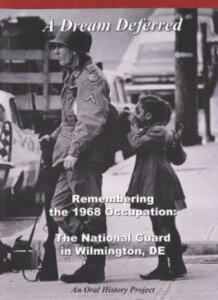Teleduction’s Powerful Documentary: “A DREAM DEFERRED”
November 29, 2018

Local Film Hopes to Highlight Historical Subject for Younger Audiences WBOC.com Original Film Review – 02/29/2008
Imagine walking out your home and encountering armed military troops at your door, as well as huge jeeps the size of tanks, patrolling your streets. Imagine now you’re not in Iraq, or some worn-torn country, but right here on Delmarva.
A DREAM DEFERRED: REMEMBERING THE 1968 OCCUPATION is the new documentary from Marilyn Whittington, the executive director of the Delaware Humanities Forum and Sharon Baker, senior producer at Teleduction, the Emmy Award-winning video production company, based in Wilmington.
A year ago, Whittington brought this idea to Baker, an idea to do an oral history of the people involved and who bore witness to the 1968 riots and subsequent aftermath, a “seminal event,” according to Whittington, in recent Delaware history.
Whittington, who herself bore witness to the events, said that it was important to capture these testimonials from those who had firsthand experience.
The 40th anniversary was fast approaching and her subjects were fast approaching the end of their lives, and shared that video documentation would not only be interesting, as a way of reflecting over a powerful and unique moment in Delaware's time, but also as a tool for posterity.
The moment was powerful and unique because following Martin Luther King Jr.'s assassination on April 4, 1968, a series of riots broke out in nearly every major American city, most notably Washington, DC, where President Lyndon Johnson had dispatched the greatest number of federal troops.
By the time, the riots ended in the Capitol, 12 people had been killed. Over 1,000 had been injured, and more than 6,000 arrested. Also, some 1,200 building had been burned, costing millions in damage.
On April 9, Gov. Charles Terry of Delaware sent National Guard soldiers to the city of Wilmington, at the request of then mayor, John Babiarz. One week later, Mayor Babiarz requested the troops be withdrawn. However, Terry refused. Despite many, many objections, Terry did not withdraw those troops until nine months later, and it wasn’t by him. The troops withdrew because Terry had reached the end of his term, and the incoming governor got them out.
Whittington confirms no other American city has ever had federal troops occupying it for that long a length of time. It was truly a unique thing in the first state and in our country. In one testimony in the movie, a gentleman recalls walking out and seeing those armed men and military jeeps in his neighborhood, and I can imagine was somewhat frightened, if not anxious.
Actual film footage of those armed men and jeeps are shown in haunting, and somewhat menacing form, as the roll down various streets in Wilmington. Daniel Collins, a producer at Teleduction, said he and his team spent several months last year finding that footage, as well as tons of photographs of that time from the News Journal archives, the Delaware Historical Society, and the Library of Congress.
The archival footage adds to the disturbing accounts we hear from the various men who describe and reveal the details of being in the mist of this occupation, or siege. As I watched and listened, I personally was disturbed, as I had never heard this story before. Yet, I am not alone.
In fact, the Humanities Forum hopes to use this documentary as an educational tool. Frances O’Malley, executive secretary of the Social Studies Coalition of Delaware and a Policy Scientist at the Center for Teacher Education at the University of Delaware, told me that Daniel Collins came to a workshop on Civil Rights that he attended, and Collins distributed copies of the documentary in DVD form to various teachers in 19 school districts in Delaware.
Collins sent me the school curriculum created especially for this documentary, and it states as its goal “to engage high-school students… and encourage teachers to develop classroom projects relating to an era of Delaware and the United States history that is danger of being forgotten.”
The curriculum also states, “This DVD can be used in several ways. It may be shown in its entirety during one class period, or broken up over the course of several days.” The curriculum contains seven chapters, each that correspond to certain segments in the movie. The curriculum has breakdowns of features, discussion points and questions.
On Thursday, Feb. 28, 2008, the Humanities Forum hosted a screening of the documentary in Wilmington and invited the general public, as well as guest speakers. It was Whittington’s hope that discussions and questions would be provoked.
Whittington reiterated that many young people like myself, or younger students, have no idea about incidents like this, or other similar ones over the course of this countries two centuries of existence that represent the struggles, the hardships and the sacrifices that were made or experienced by those who came before them, so that life could be better in the future.
She said Wilmington was burning. This incident made the cover of Time magazine, and 40 years later, people might forget about it, if movies and documentaries like this aren’t used to ensure that people remember and that they don’t forget.
Five Stars out of Five.

